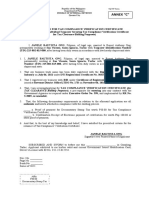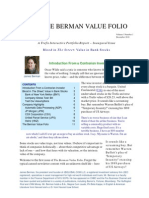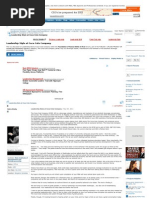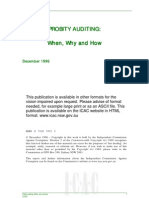Fid, Fads: If Cordorate Governance Is A We Need More
Fid, Fads: If Cordorate Governance Is A We Need More
Uploaded by
Lata DeshmukhCopyright:
Available Formats
Fid, Fads: If Cordorate Governance Is A We Need More
Fid, Fads: If Cordorate Governance Is A We Need More
Uploaded by
Lata DeshmukhOriginal Description:
Original Title
Copyright
Available Formats
Share this document
Did you find this document useful?
Is this content inappropriate?
Copyright:
Available Formats
Fid, Fads: If Cordorate Governance Is A We Need More
Fid, Fads: If Cordorate Governance Is A We Need More
Uploaded by
Lata DeshmukhCopyright:
Available Formats
Patchwork governance, patchwork integrity
Canada
If CorDorate Governance
Is a Fid, We Need
More Fads
(continuedfrom page 4)
Defining the purpose (or, in Carvers
language, Ends)
Determining appropriate limits to
what is delegated
Measuring achievements against the
demands of both the Ends and the
limits imposed in delegation
bylohn Carver
Y PERSONAL
NOTEin the previous
issue of Board Leadershipbegan
with the following sentence: Withall the
hype about corporate governance in
the air over the past few years, it may
be no wonder that media baron Conrad
Black was quoted in the May 23,2003,
Financial Post as saying, Like all fads,
corporate governance has its zealots.
Lord Conrad Black, better known to
Canadiansthan Americans, is one of
the worlds most affluent figures in the
publishing business. The complexity
and extent of his corporate holdings
are staggering.
With some risk of being accused
of Schadenfreude, I am compelled
to make note in this issue of Board
Leadership the drama that engulfed
Black in mid-November, only a few
months after the quote noted above.
The November 22 Canadian Globe
and Mail, among a flurry of Blackrelated stories, ran the following indictment of Hollinger International, Inc.,
part of Blacks empire: The company
admitted yesterday it was plagued by
a host of corporate governance problems that failed to detect possible conflicts of interest.
I know of no one who disputes Conrad
Blacks intelligence. Hes not only a savvy
businessman, but a published biographer
of Franklin D. Roosevelt. But I cannot say
the same for persons who agree to sit as
outside directors for any company in
which even a brilliant person who isnt the
100 percent owner is allowed to run things
his or her own way. It seems that the corporate landscape continues to accumulate the litter of disintegrated companies
due in part to governing boards that
JAN.-FEB.
2004
refuse to be governingboards, rendering
the term frighteninglyoxymoronic.
As always, of course, the blame
dished out in the press is heaped on
the most obvious perpetrator of the
bad deeds. Remember Kenneth Lay at
Enron? But pointing a righteous finger
at the individual-though satisfymg and
perhaps even deserved-does little to
make the future better. In fact, it is a
dysfunctional way to approach the
problem. There will always be bad
actors, often brilliant and attractive
ones. The idea of a board-and therefore the idea of governance of any type
of organization, including nonprofits
and the bodies politic-rests not on
the unattainable perfection of every
appointed leader but rather on the
belief that even though individuals may
stray, the good intentions, good faith,
and competence of the group can act
as the steadying keel deep in the water.
But that works only if the group
knows that and rises to the challenge.
Unfortunately, many of the accepted
norms in governance-again, corporate
or otherwise-act against a boards competently taking on that task in a way that
does not also trap it in trivia, micromanagement, and disempowerment of the
very people who must get the organizations job done. Ironically, not a few
best practices do just that in the
absence of a powerfully compellingand
conceptuallywhole paradigm of governance. Governance as the world still
accepts it remains a patchwork of disjointed practices. It should be no surprise
that it then produces a patchwork of probity and proper oversight.
Fadindeed. 0
Policiesfor Carver are any instruction by the board to the CEO or to the
board itself, from the very broad to the
very particular-any level of focus desired
by the board. The great strength of Policy
Governance is that it speaks prescriptively
to stipulate ends and proscriptivelyto
exclude means. When a board is prescriptive concerning means, it retains for itself,
and does not assign, accountability.
Carver emphasizesthat the board has
total accountabilityfor the organization.
Policy Governance is designed to encompass that total accountability,both the
intended results and the means used to
achieve results. It is designed to ensure the
clear assignment of accountabilityto the
CEO, with the concurrent obligationupon
the CEO to formallypresent that accountability (report)back to the board. Policy
Governance,used as intended,provides
excellencein governance.The board of
a Canadian charitable corporationthat
adopts Policy Governance has performed
duediligenceand fuElled all legal obligationsimposed on its directors.On a comparative basis, such boards and directors
are far ahead of most corporations, even
those in the world of commerce, in observing their legal and moral obligations.
The assertion in the Primer quoted at
the beginning is quite inaccurate.Any
interpretationor perception that Policy
Governance fails to assign or incompletely
assigns accountabilitydemonstratesan
erroneousunderstandingof what Carver
postulates. By not presenting the fullpicture, the sponsorsof the mimer have done
a disserviceto those who will be led to the
incorrect conclusionthat the Carver model
is unlawful in Canada. Hopefully, a new
edition of the Primer, with appropriate
corrections,will be issued without delay.
Hugh M. Kelly, Q.C., Toronto;
(4 16) 595-8 176;hkelly@millerthomson.ca
(continued on back page)
You might also like
- Michael Abrashoff - It's Your ShipDocument144 pagesMichael Abrashoff - It's Your Shipmateusblrodrigues1789% (9)
- AO 2022-0039 Supplemental Guidelines On The Grant of HEA-1662697933Document20 pagesAO 2022-0039 Supplemental Guidelines On The Grant of HEA-1662697933Brgy. Sto. Domingo100% (4)
- Charles Ellis - The Characteristics of Successful FirmsDocument7 pagesCharles Ellis - The Characteristics of Successful FirmsAndre VasconcellosNo ratings yet
- Ernst Kantorowicz - The Sovereignty of The ArtistDocument28 pagesErnst Kantorowicz - The Sovereignty of The Artistsaris808633% (3)
- CEO Leadership: Navigating the New Era in Corporate GovernanceFrom EverandCEO Leadership: Navigating the New Era in Corporate GovernanceNo ratings yet
- APPLICATION FOR TAX COMPLIANCE VERIFICATION CERTIFICATE - OngDocument1 pageAPPLICATION FOR TAX COMPLIANCE VERIFICATION CERTIFICATE - OngMarycris Caoile0% (1)
- Martin Puris - ComebackDocument128 pagesMartin Puris - Comebackydam27No ratings yet
- The Characteristics of Successful Investment Firms - Dr. Charles D. Ellis, CFADocument7 pagesThe Characteristics of Successful Investment Firms - Dr. Charles D. Ellis, CFAIgor Chalhub100% (1)
- A Guide To Apartment Owners AssociationDocument3 pagesA Guide To Apartment Owners AssociationVinod YbNo ratings yet
- Business Ethics - Chapter 5Document25 pagesBusiness Ethics - Chapter 5PhuongThyMaiNo ratings yet
- 5 Symbolic Frame WorksheetDocument4 pages5 Symbolic Frame Worksheetapi-678248054No ratings yet
- Behavioral Issues, Such As Developing Employee Knowledge, Skills and Abilities, andDocument9 pagesBehavioral Issues, Such As Developing Employee Knowledge, Skills and Abilities, andzeeshan17No ratings yet
- 6 Ethical Communities WorksheetDocument4 pages6 Ethical Communities Worksheetapi-678248054No ratings yet
- Business Ethics Now 5th Chapter 5Document23 pagesBusiness Ethics Now 5th Chapter 5Iis IstiqomahNo ratings yet
- Leading Without Authority: How the New Power of Co-Elevation Can Break Down Silos, Transform Teams, and Reinvent CollaborationFrom EverandLeading Without Authority: How the New Power of Co-Elevation Can Break Down Silos, Transform Teams, and Reinvent CollaborationNo ratings yet
- Agency Costs of Overvalued Equity: Michael C. JensenDocument17 pagesAgency Costs of Overvalued Equity: Michael C. JensenTilahun GirmaNo ratings yet
- 20 Questions Directors of Not-For-profit Organizations Should Ask About Fiduciary DutyDocument28 pages20 Questions Directors of Not-For-profit Organizations Should Ask About Fiduciary DutybatmanbittuNo ratings yet
- Boardroom Briefing 6Document36 pagesBoardroom Briefing 6Adrian Satriaji WiryawanNo ratings yet
- CH 4 EtikaDocument13 pagesCH 4 EtikaMeyraldo MarthenNo ratings yet
- Assignment On Corporate Governance: Submitted By: B.Uday Kumar Pgdm-Bifaas ROLL NO: B4-60Document12 pagesAssignment On Corporate Governance: Submitted By: B.Uday Kumar Pgdm-Bifaas ROLL NO: B4-60ravidara470No ratings yet
- Greg Pca Mod 3 HRDocument4 pagesGreg Pca Mod 3 HRapi-652481838No ratings yet
- What's Holding You Back?: 10 Bold Steps that Define Gutsy LeadersFrom EverandWhat's Holding You Back?: 10 Bold Steps that Define Gutsy LeadersNo ratings yet
- Building World Class Ethics and Compliance ProgramsDocument32 pagesBuilding World Class Ethics and Compliance ProgramsAriana López Di Rocco100% (1)
- Business Continuity and Disaster Recovery: Boardroom BriefingDocument36 pagesBusiness Continuity and Disaster Recovery: Boardroom BriefingmadunixNo ratings yet
- Dissertation On Good Corporate GovernanceDocument7 pagesDissertation On Good Corporate GovernancePaperWritingServicesCanada100% (2)
- Transparency in Corporate GroupsDocument21 pagesTransparency in Corporate GroupsARIEL FRITZ CACERESNo ratings yet
- Assignment 2Document4 pagesAssignment 2sizziNo ratings yet
- Building Better Boards: A Blueprint for Effective GovernanceFrom EverandBuilding Better Boards: A Blueprint for Effective GovernanceNo ratings yet
- CASO 2.1Document3 pagesCASO 2.1Joseantonio Garcia MorronNo ratings yet
- Leadership: "Managers and Leaders: Are They Different?"Document5 pagesLeadership: "Managers and Leaders: Are They Different?"Harshita BaidNo ratings yet
- Blind Spots, Biases, and Other Pathologies in The BoardroomDocument15 pagesBlind Spots, Biases, and Other Pathologies in The BoardroomBusiness Expert PressNo ratings yet
- Constellation Software - Culture Case StudyDocument10 pagesConstellation Software - Culture Case StudycancoesdominduimNo ratings yet
- Building Public TrustDocument9 pagesBuilding Public TrustworldbestNo ratings yet
- The Berman Value Folio: A Trefis Interactive Portfolio Report - Inaugural IssueDocument11 pagesThe Berman Value Folio: A Trefis Interactive Portfolio Report - Inaugural IssueNasir Ali RizviNo ratings yet
- 270 - How To Measure Risk Culture EffectivenessDocument4 pages270 - How To Measure Risk Culture EffectivenesssabulnesNo ratings yet
- Escaping the Growth Curse: The Path to Stronger Corporate StrategyFrom EverandEscaping the Growth Curse: The Path to Stronger Corporate StrategyNo ratings yet
- How Global Is Good Corp Gov 05Document20 pagesHow Global Is Good Corp Gov 05mariamali87No ratings yet
- Governance, Risk Management, and Compliance: It Can't Happen to Us--Avoiding Corporate Disaster While Driving SuccessFrom EverandGovernance, Risk Management, and Compliance: It Can't Happen to Us--Avoiding Corporate Disaster While Driving SuccessRating: 4 out of 5 stars4/5 (1)
- Leadership Style at Coca-Cola Company - ManagementParadise - Com - Worlds Leading Management Portal. Online MBA - Classroom To Boardroom and BeyondDocument7 pagesLeadership Style at Coca-Cola Company - ManagementParadise - Com - Worlds Leading Management Portal. Online MBA - Classroom To Boardroom and BeyondAlaa Assem0% (2)
- Leadership Acumen 16 V10 Governance Principles Vs RulesDocument5 pagesLeadership Acumen 16 V10 Governance Principles Vs RulesMistaAusNo ratings yet
- It's The Economy! The Lack of Organizational Leadership: Dr. Byron L. Cherry, SRDocument2 pagesIt's The Economy! The Lack of Organizational Leadership: Dr. Byron L. Cherry, SRteetoszNo ratings yet
- Organizational Vision and VisionaryOrganizationsDocument22 pagesOrganizational Vision and VisionaryOrganizationsGabriela BlankNo ratings yet
- Davidphilippine 74221800 2020Document97 pagesDavidphilippine 74221800 2020noemi.truran22No ratings yet
- Building A Reputation Risk Management CapabilityDocument20 pagesBuilding A Reputation Risk Management CapabilityEdelman100% (2)
- Us Aers Tone at The Top Sept 2014Document8 pagesUs Aers Tone at The Top Sept 2014Nicole Romero EspínolaNo ratings yet
- Assessment 9 - RevisedDocument8 pagesAssessment 9 - RevisedBrian KyaloNo ratings yet
- Wells Fargo Case StudyDocument15 pagesWells Fargo Case StudySodeinde JedidiahNo ratings yet
- Resolute: Lead with purpose, navigate disruption, and build indestructible organizations.From EverandResolute: Lead with purpose, navigate disruption, and build indestructible organizations.Leo StuartNo ratings yet
- It Takes a CEO: It's Time to Lead with IntegrityFrom EverandIt Takes a CEO: It's Time to Lead with IntegrityRating: 2.5 out of 5 stars2.5/5 (2)
- Legal Business 2013Document2 pagesLegal Business 2013UntappedTalentNo ratings yet
- Pca 4 Political FrameDocument4 pagesPca 4 Political Frameapi-650843806No ratings yet
- Bach Blake 2016 Frame or Get Framed The Critical Role of Issue Framing in Nonmarket ManagementDocument22 pagesBach Blake 2016 Frame or Get Framed The Critical Role of Issue Framing in Nonmarket Managementmccallk2003No ratings yet
- EXCERPT-youre-about-to-make-a-terrible-mistake by oliver sibonyDocument15 pagesEXCERPT-youre-about-to-make-a-terrible-mistake by oliver sibonytshrek74No ratings yet
- Diversity in Corporate GovernanceDocument26 pagesDiversity in Corporate GovernanceShameza DavidNo ratings yet
- Calculated RiskDocument16 pagesCalculated RiskSuresh RamachandranNo ratings yet
- Money for Nothing: How CEOs and Boards Enrich Themselves While Bankrupting AmericaFrom EverandMoney for Nothing: How CEOs and Boards Enrich Themselves While Bankrupting AmericaRating: 2.5 out of 5 stars2.5/5 (2)
- How To Evaluate Corporate StrategyDocument27 pagesHow To Evaluate Corporate Strategymonomono90No ratings yet
- Chapter I12Document25 pagesChapter I12lizzardkinNo ratings yet
- Human Resource FrameDocument4 pagesHuman Resource Frameapi-720147459No ratings yet
- Deconstructing American Business IIDocument42 pagesDeconstructing American Business IIJosephine QuNo ratings yet
- 3 HR Frame WorksheetDocument5 pages3 HR Frame Worksheetapi-678248054No ratings yet
- Bogle StatementDocument24 pagesBogle StatementjimhoopsNo ratings yet
- (Micro) Fads Asset Evidence: FuturesDocument23 pages(Micro) Fads Asset Evidence: FuturesLata DeshmukhNo ratings yet
- A Homogenous Assay of FAD Using A Binding Between Apo-Glucose Oxidase and FAD Labeled Withan Electroactive CompoundDocument6 pagesA Homogenous Assay of FAD Using A Binding Between Apo-Glucose Oxidase and FAD Labeled Withan Electroactive CompoundLata DeshmukhNo ratings yet
- Covalent Immobilization of and Glucose Oxidase On Carbon ElectrodesDocument5 pagesCovalent Immobilization of and Glucose Oxidase On Carbon ElectrodesLata DeshmukhNo ratings yet
- Factor Analysis of Spectroelectrochemical Reduction of FAD Reveals The P K of The Reduced State and The Reduction PathwayDocument9 pagesFactor Analysis of Spectroelectrochemical Reduction of FAD Reveals The P K of The Reduced State and The Reduction PathwayLata DeshmukhNo ratings yet
- Gepi 1370100621Document5 pagesGepi 1370100621Lata DeshmukhNo ratings yet
- BF 01456737Document8 pagesBF 01456737Lata DeshmukhNo ratings yet
- Apj 526Document7 pagesApj 526Lata DeshmukhNo ratings yet
- Electrochemical and Catalytic Properties of The Adenine Coenzymes FAD and Coenzyme A On Pyrolytic Graphite ElectrodesDocument7 pagesElectrochemical and Catalytic Properties of The Adenine Coenzymes FAD and Coenzyme A On Pyrolytic Graphite ElectrodesLata DeshmukhNo ratings yet
- Infrared Spectroscopic Study of Thermally Treated LigninDocument4 pagesInfrared Spectroscopic Study of Thermally Treated LigninLata DeshmukhNo ratings yet
- Production of Recombinant Cholesterol Oxidase Containing Covalently Bound FAD in Escherichia ColiDocument10 pagesProduction of Recombinant Cholesterol Oxidase Containing Covalently Bound FAD in Escherichia ColiLata DeshmukhNo ratings yet
- BF 00314252Document2 pagesBF 00314252Lata DeshmukhNo ratings yet
- Editorial: Etiology Nutritional Fads: WilliamDocument4 pagesEditorial: Etiology Nutritional Fads: WilliamLata DeshmukhNo ratings yet
- Spectroscopic Study of Molecular Associations Between Flavins FAD and RFN and Some Indole DerivativesDocument6 pagesSpectroscopic Study of Molecular Associations Between Flavins FAD and RFN and Some Indole DerivativesLata DeshmukhNo ratings yet
- Amperometric Assay Based On An Apoenzyme Signal Amplified Using NADH For The Detection of FADDocument4 pagesAmperometric Assay Based On An Apoenzyme Signal Amplified Using NADH For The Detection of FADLata DeshmukhNo ratings yet
- Task Group Osition Paper On Unbiased Assessment of CulturallyDocument5 pagesTask Group Osition Paper On Unbiased Assessment of CulturallyLata DeshmukhNo ratings yet
- Spectroscopic Study of The Molecular Structure of A Lignin-Polymer SystemDocument5 pagesSpectroscopic Study of The Molecular Structure of A Lignin-Polymer SystemLata DeshmukhNo ratings yet
- FAD Used As A Mediator in The Electron Transfer Between Platinum and Several BiomoleculesDocument11 pagesFAD Used As A Mediator in The Electron Transfer Between Platinum and Several BiomoleculesLata DeshmukhNo ratings yet
- Spectroscopic Study of Intermolecular Complexes Between FAD and Some Fl-Carboline DerivativesDocument5 pagesSpectroscopic Study of Intermolecular Complexes Between FAD and Some Fl-Carboline DerivativesLata DeshmukhNo ratings yet
- Integrated Project Development Teams: Another F A D - ., or A Permanent ChangeDocument6 pagesIntegrated Project Development Teams: Another F A D - ., or A Permanent ChangeLata DeshmukhNo ratings yet
- Sce 20287Document3 pagesSce 20287Lata DeshmukhNo ratings yet
- Raman Scattering in Tellurium-Metal Oxyde Glasses: Journal of Molecular Structure 349 (1995) 413-416Document4 pagesRaman Scattering in Tellurium-Metal Oxyde Glasses: Journal of Molecular Structure 349 (1995) 413-416Lata DeshmukhNo ratings yet
- A Rapid Micromethod For Determination of FMN and FAD in MixturesDocument5 pagesA Rapid Micromethod For Determination of FMN and FAD in MixturesLata DeshmukhNo ratings yet
- Contrasting Zones of Comfortable Competence: Popular Culture in A Phonics LessonDocument15 pagesContrasting Zones of Comfortable Competence: Popular Culture in A Phonics LessonLata DeshmukhNo ratings yet
- DOI 10.1007/s12138-009-0064-z: © Springer Science+Business Media B.V. 2008Document5 pagesDOI 10.1007/s12138-009-0064-z: © Springer Science+Business Media B.V. 2008Lata DeshmukhNo ratings yet
- A Defense of Popular Culture: Brustein, Munson, Rothstein, Simon, Nichols, Kimball, and Pinsker 73Document6 pagesA Defense of Popular Culture: Brustein, Munson, Rothstein, Simon, Nichols, Kimball, and Pinsker 73Lata DeshmukhNo ratings yet
- J Religion 2003 11 003Document2 pagesJ Religion 2003 11 003Lata DeshmukhNo ratings yet
- Copyright OnlyDocument3 pagesCopyright OnlyJanina C AbarquezNo ratings yet
- Draft Deed of AssignmentDocument3 pagesDraft Deed of AssignmentShakedeNo ratings yet
- I. Ibingira and-WPS OfficeDocument2 pagesI. Ibingira and-WPS Officecharlestweheyo74No ratings yet
- HR Judicial DecisionsDocument6 pagesHR Judicial DecisionsSebin JamesNo ratings yet
- Adjudication Order in Respect of Monarch Research & Brokerage Pvt. Ltd. in The Matter of M/s. Sky Industries Ltd.Document29 pagesAdjudication Order in Respect of Monarch Research & Brokerage Pvt. Ltd. in The Matter of M/s. Sky Industries Ltd.Shyam SunderNo ratings yet
- What Is Probity AuditDocument19 pagesWhat Is Probity AuditPuji LestariNo ratings yet
- Sullivian W.G, Wicks E.M and Koelling C.P (2012)Document21 pagesSullivian W.G, Wicks E.M and Koelling C.P (2012)Mahammad YusifNo ratings yet
- Salary Slip Last MonthDocument1 pageSalary Slip Last MonthPraveshNo ratings yet
- Copyright RegistrationDocument2 pagesCopyright Registrationnikhil jkcNo ratings yet
- Procedural Safeguards HandoutDocument1 pageProcedural Safeguards Handoutapi-674941941No ratings yet
- CLAT PG 2022 Official Question Paper with Answer Key and Detailed Solutions_1729328134526Document57 pagesCLAT PG 2022 Official Question Paper with Answer Key and Detailed Solutions_1729328134526gluck.vaish201No ratings yet
- Group 2Document4 pagesGroup 2Play With NoobsNo ratings yet
- Contracts Classification: in Construction ProjectsDocument23 pagesContracts Classification: in Construction ProjectsNaoufal ElouardiNo ratings yet
- G.R. No. 165828 - National Power Corp. vs. Heirs of SangkayDocument2 pagesG.R. No. 165828 - National Power Corp. vs. Heirs of SangkaySittie Ainna Acmed UnteNo ratings yet
- Giros o Rotaciones 196622 Vicente de Los Ríos PeñuelaDocument1 pageGiros o Rotaciones 196622 Vicente de Los Ríos PeñuelaJoseCarlosCurbeloGarciaNo ratings yet
- Urdu PoetryDocument1 pageUrdu PoetryShahzad Ali GujjarNo ratings yet
- Manila International Airport Authority vs. CADocument3 pagesManila International Airport Authority vs. CABernadette SandovalNo ratings yet
- DirectoryDocument16 pagesDirectoryMILAN M MathewsNo ratings yet
- Letter To UmemeDocument3 pagesLetter To Umemekamarabe johnNo ratings yet
- How To Start A Business PartnershipDocument4 pagesHow To Start A Business PartnershipKagami BugayNo ratings yet
- March 10, 2015 A.C. No. 5816 DR. ELMAR 0. PEREZ, Complainant, Atty. Tristan A. Catindig and Atty. Karen E. Baydo, Respondents. DecisionDocument6 pagesMarch 10, 2015 A.C. No. 5816 DR. ELMAR 0. PEREZ, Complainant, Atty. Tristan A. Catindig and Atty. Karen E. Baydo, Respondents. DecisionRose Ann LascuñaNo ratings yet
- Aaron Swartz - WikipediaDocument468 pagesAaron Swartz - WikipediaBeauford A. StenbergNo ratings yet
- Civil Suit 487 of 2015Document13 pagesCivil Suit 487 of 2015nicole gichuhiNo ratings yet
- GR No 247234Document27 pagesGR No 247234Ashly Kate DaulayanNo ratings yet
- The Racist Origins of US Gun Control: Laws Designed To Disarm Slaves, Freedmen, and African-AmericansDocument12 pagesThe Racist Origins of US Gun Control: Laws Designed To Disarm Slaves, Freedmen, and African-AmericanssaffauraNo ratings yet
- NM V John Wesley School and Another (4594 - 2016) (2018) ZAKZDHC 64 2019 (2) SA 557 (KZD) (19 December 2018)Document27 pagesNM V John Wesley School and Another (4594 - 2016) (2018) ZAKZDHC 64 2019 (2) SA 557 (KZD) (19 December 2018)iwNo ratings yet



















































































































